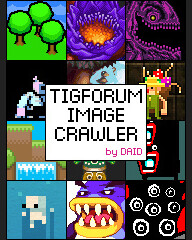Posts from ‘Business’ Category
Who Has the Biggest…
By: Derek Yu
On: January 20th, 2008
John Romero had some not-so-nice words for Gamecock CEO (and former Ion Storm CEO) Mike Wilson on his blog, and Mike responded in kind in the comments. The whole incident is funny and ugly and not a little bit sad. Read it and weep. Or don’t!
Gamecock is worth mentioning at least once, however. Wilson once described his group in a Gamasutra interview thusly:
Which could be a good idea if its founders weren’t destroying their reputation (what there is of it) piece-by-piece by throwing money away on lavish clown orgies and generally making cocks of themselves. Independent developers could always use more resources, but do they really need this? Well, no.
Cryptic Sea Megasale
By: Derek Yu
On: January 11th, 2008
Edmund McMillen, artist/designer at Cryptic Sea, has informed me that Gish is now on sale for about the next week or so (via Steam). The formerly $10 game is now $5. If you haven’t yet tried this totally sweet platform game, now’s your chance.
And Blast Miner, the physics-based puzzler which I once panned (like a total dick) and eventually accepted (but only after Edmund added a puzzle mode and also did a 360 piledriver on me at IGF), is now $10, down from the original $20.
Casual Game Reviews Don’t Matter
By: Derek Yu
On: December 14th, 2007
–Kathy Vrabeck, President, EA Casual
Next-Gen has an interesting look into the correlation between casual game reviews and casual game sales. Not surprisingly, bad reviews don’t really impact the sales of casual games, since ostensibly casual gamers don’t read reviews. (And if we’re talking about IGN, then that’s probably a good thing.)
What I find amusing, though, is how callous the perceived attitude is toward casual gamers by the people who publish them. Here’s a quote from EA Casual VP, Russell Arons:
Geez. I realize that no one is forcing people to buy casual games and that a lot of people enjoy them. Regardless, I’m looking forward to the day when women aged 25 to 34 are not viewed merely as apathetic cash cows with money-laden milk udders, content to chew whatever gaming cud you give them.
Casual Games, Cloning, and Discussion Thereof
By: Derek Yu
On: November 30th, 2007
Russell Carroll, all around nice guy, marketing director at Reflexive, and the webmaster of Game Tunnel, has an interesting op-ed on Gamasutra called “”http://www.gamasutra.com/php-bin/news_index.php?story=16426">Cloning Created the Casual Business." In it he talks about the impact of cloning on the casual games industry (now apparently worth $2.25 billion).
Russ reveals that the average Hidden Object game on Reflexive sells roughly 3 games to the sale of every average “original” title. I think this indicates that clones can sell. It doesn’t, however, convince me that they sell better than original games (note: which is not the argument Russ is trying to make), since a number of important comparisons are overlooked, such as the sales of clones to the originals that spawned them. Nor does it speak to the quality of the original games that didn’t sell so well. I think clones are just easier to make, and probably give a better return on investment than your average original game, which is why people make them.
It’s interesting to note that Digital Eel, the developers behind Strange Adventures in Infinite Space, have just made two more of their games free, and have also released a $10 casual matching game, Soup du Jour. The game has a neat physics-ey aspect, but it seems like quite a deviation from their other games, so I wonder…
My attitude about casual games has vacillated from derision, to indifference, to some appreciation (for bringing in non-gamers to the fold, so to speak). Now, I think it’s a bit of all three. I still hope that “core” and “hardcore” developers will not see casual cloning as an easy way out. My belief is still that a good original game will outsell any clone, and creating an original title has side benefits, like curing cancer.
I’m serious, they did a study where they placed two monkeys with cancer in a basement and had them make games. One monkey made a clone of Diner Dash, and the other made an original title about dealing with cancer as a monkey. The Diner Dash monkey died after a week with a tumor the size of a minivan, and the other monkey survived and lived a long and prosperous life! Look it up on the internet.
Anyway, thanks, Russ, for the article, and I hope to see more like it!
How to Make it Big in Games
By: Derek Yu
On: September 15th, 2006
Just discovered a blog by Jeff Tunnell, who co-founded Dynamix back in the day (whoa, I didn’t know that!) and also Garage Games (the Torque Engine). The blog, Make it Big in Games, looks like a really great read for independent game developers or anyone interested in an insider’s look at the industry. I’m going to have to spend a night just going through the archives…







